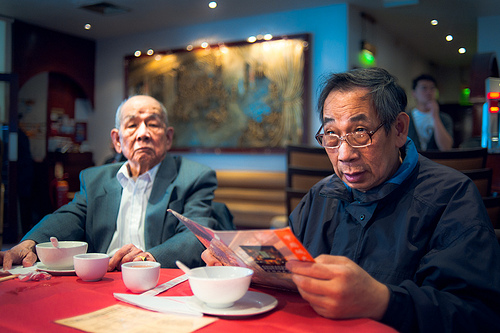
I was in Hong Kong in transit to Australia, with a day up my sleeve. So I decided to try out a local restaurant that had been recommended. Sitting there, surrounded by the most wonderful aromas and plates of delicious looking food I realised I had a problem.
The menu was in Chinese with no English translation or helpful photographs. It was also massive, about 20 pages long. I had absolutely no idea what to attempt to order.
So when the waiter came back with his notebook, I pointed to the dish of food being eaten on the next table that looked particularly delicious and sat back eagerly in anticipation of a wonderful authentic Chinese meal.
Unfortunately something must have gotten lost in translation as what arrived was an enormous steak, and a pair of chopsticks.
I don’t know if you have ever tried to eat steak with chopsticks. It’s the sort of thing you could try as a party game or to play a prank on someone. Without a knife in sight the only way I could eat said steak, which was actually quite good, was to spear it and nibble it daintily around the edges trying not to allow the whole thing to slide down onto my fingers.
But why do we choose what someone else is having when faced with an overwhelm of choice (even if you can understand the language)?
Researchers from Hong Kong University of Science and Technology (how appropriate), Tilburg and Boston Universities suggest that we choose by observing someone else’s choice when we are uncertain of our own preferences.
They demonstrated this so-called social default effect by asking study participants who were not Korean to choose between two Korean brands of tea. Half were allowed to first observe a non-Asian person making the selection. The remaining half simply were shown the two teas without any other prompts.
Unsurprisingly those in the first group were more likely to choose the same tea as the one selected by the non-Asian person.
But when English text was added to the packaging, participants were able to better justify their own decisions and were less influenced by the non-Asian person.
Which goes to show that translation (even when badly done) or a photo that provides more information will readily reduce the social default effect.
Something to be mindful in our daily lives, of as we are often unaware of our subconscious biases and behavioural mimicry.
Ref:
Young Eun Huh, Joachim Vosgerau, and Carey K. Morewedge. Social Defaults: Observed Choices Become Choice Defaults. Journal of Consumer Research, October 2014
Photo Credit: <a href=”https://www.flickr.com/photos/10317286@N03/8050287530/”>TGKW</a> via <a href=”http://compfight.com”>Compfight</a> <a href=”https://www.flickr.com/help/general/#147″>cc</a>

